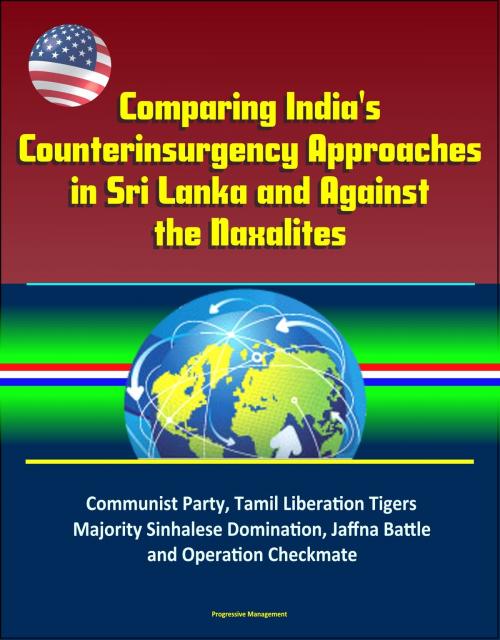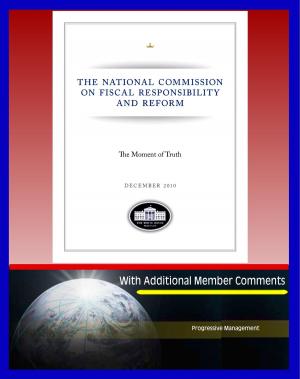Comparing India's Counterinsurgency Approaches in Sri Lanka and Against the Naxalites: Communist Party, Tamil Liberation Tigers, Majority Sinhalese Domination, Jaffna Battle and Operation Checkmate
Nonfiction, History, Asian, India, Military, Strategy| Author: | Progressive Management | ISBN: | 9781370908486 |
| Publisher: | Progressive Management | Publication: | February 23, 2017 |
| Imprint: | Smashwords Edition | Language: | English |
| Author: | Progressive Management |
| ISBN: | 9781370908486 |
| Publisher: | Progressive Management |
| Publication: | February 23, 2017 |
| Imprint: | Smashwords Edition |
| Language: | English |
This excellent report has been professionally converted for accurate flowing-text e-book format reproduction. India possesses a rich history of combating insurgencies throughout its country. The Naxalite movement originated when India gained its independence and now seventy years later presents the greatest insurgency threat. India also experienced a pivotal counterinsurgency experience as a third party actor in Sri Lanka. This research study sought to compare the influence of India's external counterinsurgency approaches in Sri Lanka to their domestic approaches against the Naxalites. The methodology for this research consists of analyzing each case study for the appearance or absence of twenty-four counterinsurgency approaches. This research found no evidence of counterinsurgency operations in Sri Lanka influencing future domestic counterinsurgency operations against the Naxalites. The major counterinsurgency findings include the necessity to enact political reform; to reduce insurgent support; to recruit, train, and employ local security forces; to co-opt the population; and to achieve unity of effort.
Insurgencies have and will continue to threaten governments around the world. How governments and their militaries, conduct counterinsurgency varies from country to country. These variations occur for different reasons and therefore make it difficult to generalize the use of counterinsurgency. This makes research even more important to the understanding and effects of counterinsurgency operations. Additionally, critical to any learning organization is the use of history and previous experiences. Recent United States military experience comes from operations in Iraq and Afghanistan, but other countries have a long and/or recent history of counterinsurgency operations. The United States' perspective is as a third party entity coming from the outside to assist a host nation with their own insurgency issues. The United States must understand operations from this external actor perspective and must also understand operations from the perspective of the host nation. Finally, it is just as important to understand the similarities and differences between these perspectives. As the United States moves forward with a focus on maintaining the status quo within other countries, it behooves the military to look outside of its own experience to learn from others.
The primary research question of this study is: how does India's counterinsurgency approach against the Naxalites compare to their experience in Sri Lanka? The hypothesis is that India's Sri Lankan experience influenced their counterinsurgency approach towards future Naxalite operations. The next section of this paper will start with a summary of counterinsurgency literature relevant to this research question. The third section will outline the methodology chosen to test the hypothesis and therefore answer the research question. Sections four and five provide the specific case studies researched and analyzed. Section four outlines and analyzes India's Peace Keeping Force's (IPKF) operations in Sri Lanka from 1987-1990. Section five outlines and analyzes the Naxalite insurgency. Section six compares and analyzes the data from both case studies. Section seven, the conclusion, will combine each analysis to test the hypothesis and thereby answer the research question. Additionally, the conclusion also includes a recommendation for future research.
This excellent report has been professionally converted for accurate flowing-text e-book format reproduction. India possesses a rich history of combating insurgencies throughout its country. The Naxalite movement originated when India gained its independence and now seventy years later presents the greatest insurgency threat. India also experienced a pivotal counterinsurgency experience as a third party actor in Sri Lanka. This research study sought to compare the influence of India's external counterinsurgency approaches in Sri Lanka to their domestic approaches against the Naxalites. The methodology for this research consists of analyzing each case study for the appearance or absence of twenty-four counterinsurgency approaches. This research found no evidence of counterinsurgency operations in Sri Lanka influencing future domestic counterinsurgency operations against the Naxalites. The major counterinsurgency findings include the necessity to enact political reform; to reduce insurgent support; to recruit, train, and employ local security forces; to co-opt the population; and to achieve unity of effort.
Insurgencies have and will continue to threaten governments around the world. How governments and their militaries, conduct counterinsurgency varies from country to country. These variations occur for different reasons and therefore make it difficult to generalize the use of counterinsurgency. This makes research even more important to the understanding and effects of counterinsurgency operations. Additionally, critical to any learning organization is the use of history and previous experiences. Recent United States military experience comes from operations in Iraq and Afghanistan, but other countries have a long and/or recent history of counterinsurgency operations. The United States' perspective is as a third party entity coming from the outside to assist a host nation with their own insurgency issues. The United States must understand operations from this external actor perspective and must also understand operations from the perspective of the host nation. Finally, it is just as important to understand the similarities and differences between these perspectives. As the United States moves forward with a focus on maintaining the status quo within other countries, it behooves the military to look outside of its own experience to learn from others.
The primary research question of this study is: how does India's counterinsurgency approach against the Naxalites compare to their experience in Sri Lanka? The hypothesis is that India's Sri Lankan experience influenced their counterinsurgency approach towards future Naxalite operations. The next section of this paper will start with a summary of counterinsurgency literature relevant to this research question. The third section will outline the methodology chosen to test the hypothesis and therefore answer the research question. Sections four and five provide the specific case studies researched and analyzed. Section four outlines and analyzes India's Peace Keeping Force's (IPKF) operations in Sri Lanka from 1987-1990. Section five outlines and analyzes the Naxalite insurgency. Section six compares and analyzes the data from both case studies. Section seven, the conclusion, will combine each analysis to test the hypothesis and thereby answer the research question. Additionally, the conclusion also includes a recommendation for future research.















